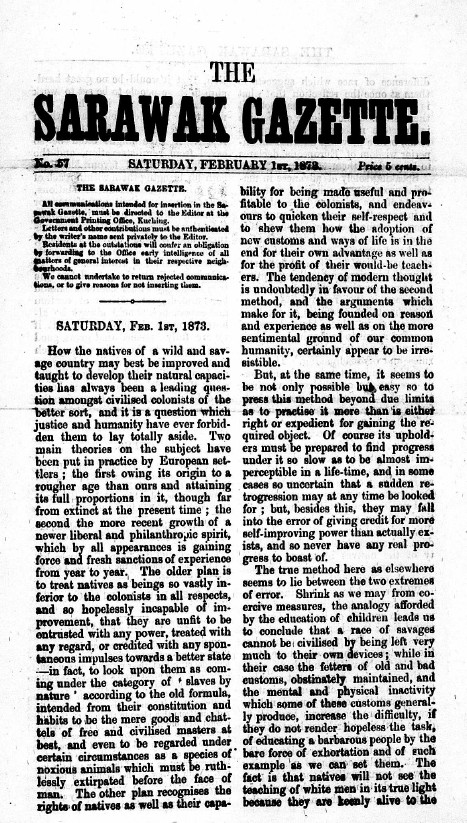Kuching, Sarawak is a lovely place. Clean and with a relaxing atmosphere, it is difficult to imagine it as a place of suffering. However, for many of its early years it was probably not such a nice place.
I came across this article from the Sarawak Gazette for 1 February 1873. It is about colonial policy, and in particular, about whether one should use force in order to “improve” the natives.
“How the natives of a wild and savage country may best be improved and taught to develop their natural capacities has always been a leading question amongst civilized colonists of the better sort,” the article begins.
The writer then goes on to say that there are two main theories on the subject. The first originates in “a rougher age” and is “to treat natives as beings so vastly inferior to the colonists in all respects, and so hopelessly incapable of improvement, that they are unfit to be trusted with any power, treated with any regard, or credited with any spontaneous impulses towards a better state. . .”
The second is the product of a “newer liberal and philanthropic spirit” and is to recognize “the rights of natives as well as their capability for being made useful and profitable to the colonists, and endeavors to quicken their self-respect and to show them how the adoption of new customs and ways of life is in the end for their own advantage as well as for the profit of their would-be teachers.”
While the latter approach is more noble, the author states that it is impractical, and coercion is still to some extent necessary.
The author then goes on to talk about the specific examples of the enforcement of sanitary rules and road making, argues that while both of these endeavors are beneficial for the natives, they can only be achieved with the use of coercion.
In talking about attempting to get the natives to clean up their houses to make them more hygienic, for instance, the author states that, “Anyone who is acquainted with the surroundings of an ordinary Malay or Dyak house must be prepared to grant that uncleanliness is its normal condition, and any care for the removal of filth and offal the exception, and there does not appear to be much probability of the natives improving in this respect unless some pressure is put upon with from without.”
Getting the natives to build roads, on the other, strikes the author as a bit easier. “It also occurs to us, hearing as we do continually of the abject poverty and destitution which prevail in large sections of the native population, that it would be no great hardship to these people to be set to work for moderate wages, in which food might be included, on roads which they would afterwards have to keep in repair.”
This is a fascinating document. It is written in beautiful language, but the lovely words in the text are essentially approving oppression and exploitation. Colonial doublespeak.



